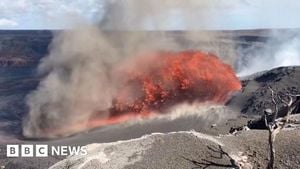In a dramatic turn for one of Florida’s most controversial immigration projects, a Miami federal judge has temporarily halted all new construction at the so-called "Alligator Alcatraz" detention facility, a sprawling complex in the heart of the Everglades, pending further hearings on its environmental impact. The decision, issued on August 7, 2025, by U.S. District Judge Kathleen Williams, has sent shockwaves through state agencies, environmental groups, and immigrant rights advocates alike.
The Alligator Alcatraz facility—officially located at the Dade-Collier Training and Transition Airport within the Big Cypress ecosystem—has been a lightning rod for debate since its inception. The 30-square-mile property is designed to eventually house up to 5,000 migrant detainees. Its moniker comes from the fact that the site is not only remote but also guarded by natural barriers: alligators and pythons. According to Fox News, the facility is already operational, holding hundreds of detainees, and is equipped for rapid expansion.
Judge Williams’ order, which lasts for 14 days, puts the brakes on any new lighting, paving, fencing, filling, or placement of additional structures at the site. However, the facility’s day-to-day operations—including the detention of migrants—will continue during this period. The judge’s decision came after two days of heated hearings, during which attorneys for environmental groups, Native American tribes, and state and federal officials debated whether the project had violated key environmental laws.
The heart of the legal battle centers on the National Environmental Policy Act (NEPA), a federal law that requires government agencies to assess the environmental effects of major construction projects before proceeding. The Friends of the Everglades and the Center for Biological Diversity, joined by Earthjustice and the Miccosukee Tribe, filed suit in late June, arguing that the Alligator Alcatraz project was advanced without the environmental review required by NEPA. Their complaint asserts that the state rushed ahead with construction at the behest of the Department of Homeland Security, operating under a 287(g) agreement that deputizes Florida officers to perform immigration functions under ICE supervision.
“It’s a relief that the court has stepped in to protect the Everglades’ sensitive waters, starry skies and vulnerable creatures from further harm while we continue our case,” Elise Bennett, Florida and Caribbean director and an attorney at the Center for Biological Diversity, told Fox News Digital. “We’re ready to press forward and put a stop to this despicable plan for good.”
During testimony on August 6 and 7, the court heard that at least 20 acres—roughly 800,000 square feet—have already been paved at the site. Environmental advocates raised alarms that stormwater runoff from the new asphalt could pollute the Everglades’ fragile, nutrient-poor wetlands if not properly managed. Perhaps most striking was the testimony of a veteran panther biologist, who warned that industrial lighting, increased traffic, and human activity could displace endangered Florida panthers from approximately 2,000 acres of their habitat. With only an estimated 120 to 230 panthers remaining statewide, the potential impact on this iconic species has become a focal point of the case.
Paul Schwiep, an attorney for the environmental groups, urged Judge Williams to issue a temporary restraining order to halt any new construction at the site. The judge, according to Fox News, pressed Florida attorney Jesse Panuccio to consider voluntarily pausing construction, noting that anything built now would likely be permanent, regardless of the case’s outcome.
Florida officials, meanwhile, have remained defiant. "Today’s ruling by an activist judge will have no impact on immigration enforcement in Florida," said Alex Lanfranconi, communications director for Governor Ron DeSantis. "Alligator Alcatraz will remain operational, continuing to serve as a force multiplier to enhance deportation efforts." The office of Attorney General James Uthmeier vowed to appeal the ruling, with communications director Jeremy Redfern stating, "Judge Williams’ order is wrong, and we will fight it. However, it does not shut down Alligator Alcatraz, which will continue to send illegal aliens back to where they came from."
In court, Florida and federal government attorneys argued that NEPA does not apply to the project because the state “controls” the site, not the federal government. Yet Judge Williams pointed to the 287(g) framework of the Immigration and Nationality Act, which places state personnel under federal direction for immigration enforcement, suggesting that federal environmental oversight may indeed be warranted. At this preliminary stage, the judge found that the plaintiffs demonstrated a likelihood of success on their NEPA-based claim and that allowing further construction during the court’s recess could risk “irreparable environmental harm.”
The lawsuit is just one of two major legal challenges facing Alligator Alcatraz. A separate suit, filed by a civil rights group, alleges that detainees’ constitutional rights are being violated at the facility—citing claims that some are barred from meeting lawyers and are being held without charges. These allegations, if proven, could add yet another layer of complexity to an already contentious project.
According to the complaint, the complex could cost as much as $450 million annually once fully built. This staggering figure, combined with the environmental and civil rights controversies, has put the project under a national spotlight. The Associated Press reported that the court’s temporary restraining order also binds any contractors "in active concert" with state or federal defendants, ensuring that no workaround can be used to circumvent the pause.
For now, the judge’s ruling preserves the status quo, preventing further expansion until the court can complete its review of the facts. The hearing on the motion for a preliminary injunction is set to resume on Tuesday, August 12. Environmental groups and tribal advocates are hoping for a more permanent halt, while state officials remain adamant that the facility is essential for immigration enforcement and will ultimately prevail in court.
As the legal drama unfolds, the fate of the Everglades, its endangered species, and the thousands of migrants who may pass through Alligator Alcatraz hang in the balance. With both environmental and constitutional stakes in play, the coming weeks promise to be pivotal for Florida’s most controversial detention center.




